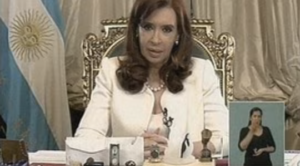The Financial Times (online), June 17 2014
Cristina Fernández, Argentina’s president, took to the airwaves soon after 9 pm local time on Monday, minutes after the USA had beaten Ghana 2-1 in the World Cup. Dressed all in white, she was in schoolmistress spirit, giving viewers a brief history of Argentina’s economic woes and the roots of its recent problems, which she put down to the military dictatorship which started with the coup d’etat of March 24, 1976. She traced those issues into the 1980s and the one-to-one dollar convertibility of the 1990s, to the 2001/2002 economic crash. She noted the change of stance initiated under her deceased husband, former president Néstor Kirchner – whom she referred to as “the president of all Argentines” – and continued under her two mandates.
She spoke for about 25 minutes (relatively little for her) and said little to clarify what Argentina’s stance now is, other than underlining that the holdouts were welcome to the same terms as those of the restructuring in 2005 and 2010 and stressing Argentina’s willingness to negotiate, while making sure to paint the “speculative” holdouts in as bad a light as possible.
Some selected excerpts:
Under Néstor Kirchner, she said: “Argentina, without access to foreign capital, began to eliminate the ‘financial bicycle’ [a reference to very high interest rates under the dictatorship] for the first time and started to pay its debt with real resources, with its own resources, with resources that were a product of the country’s growth.” At the same time, she added, millions of jobs were created.
She compared a country in default to a company in bankruptcy and identified a double standard, given that more than 90 per cent of Argentina’s creditors had entered into the restructuring of 2005 and 2010:
“When a company becomes bankrupt… it’s enough for 66 per cent of the creditors to be OK with what the debtor proposes paying in order for the bankruptcy to be lifted and the debtor to be able to start paying. This is a percentage that is normally required everywhere, even in the United States.”

She spoke of the practice of buying ‘junk bonds’ after a country has already defaulted, with reference to ‘vulture funds’ who buy bonds at a fraction of face value: “Who would buy bonds from a country that has defaulted on its debt and isn’t paying? Only someone who is going to speculate – and has all the time in the world to speculate – in the hope that the country in question recovers and then they can pounce on them once more.” She produced a graph to illustrate her account of NML, one of the leaders of the holdouts, and its “unethical” practices. She explained that bonds were bought by NML in 2008 (seven years after the default) for a total of $48.7m – and that by 2014 those bonds had risen in value by 1,608 per cent:
“I don’t even think that in organised crime there is a return rate of 1,608 per cent in such a short time.”
She said Argentina could not pay the holdouts (as ordered by the US courts) because the case at issue represented 1 per cent of bondholders and would open the floodgates to holders of another 7 per cent to win similar cases, which would leave Argentina having to pay $15bn: “This is more than half of the total reserves in the central bank. This is something absurd – or rather impossible – that a country sets aside more than 50 per cent of its monetary reserves in a sole payment to creditors.” She added that the exchange bondholders – those who agreed to the 2005 and 2010 restructuring – might also decide to pursue a better deal.
She turned to Repsol and the Paris Club (with both of whom Argentina has recently reached agreements) and said that what she had achieved with the latter, eight previous Argentine governments had tried and failed to do:
“Argentina’s willingness to negotiate has been more than apparent. We negotiated in 2005, we negotiated in 2010, we negotiated just a few days ago with the finalising of agreements with none other than Repsol – the main Argentine petroleum company that was expr
opriated, leading to judicial proceedings. But we were able to negotiate and reach an agreement, stopping the judicial proceedings. And also a few days ago we were able to definitively resolve the debt with the Paris Club for the first time in history.”
And she closed with some – perhaps – enigmatic remarks:
“I want to tell you something – or confess something. This sentence [from the US Supreme Court] didn’t surprise me. I expected this sentence.
“This is isn’t an economic, financial, judicial or legal problem – it’s the validation of a business model on a global scale that, if it continues, will produce unimaginable tragedies. We want to honour our debts – and we will do – but what we don’t want is to be accessories in this form of doing business. “Argentina won’t default on its restructured debt and is willing to negotiate. What it doesn’t want is to be submitted to extortion.”
Does this leave the door open to a deal with the holdouts? Argentina may be unable or unwilling to make a cash payment of $15bn but it could contemplate issuing new bonds to that value – which would likely be acceptable to the holdouts. The president gave no cledar indication of the answer. But an answer will have to come soon enough.